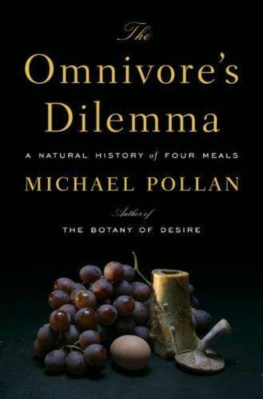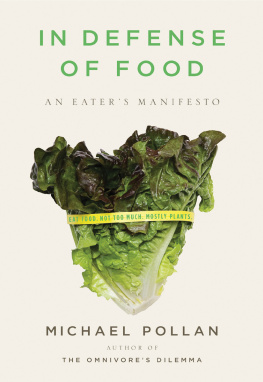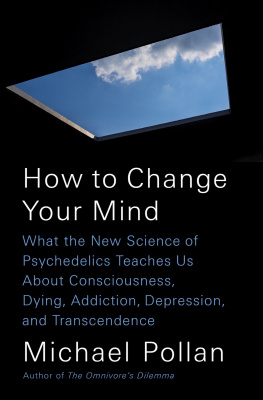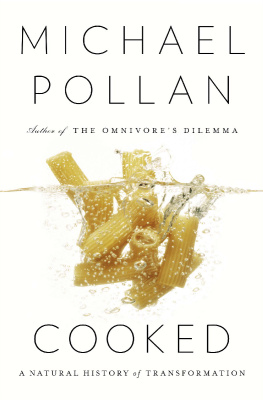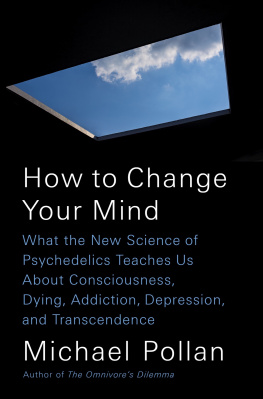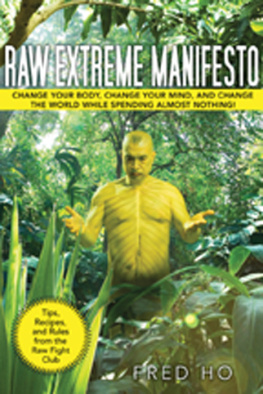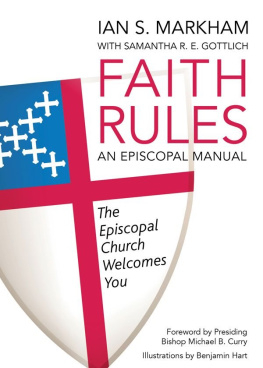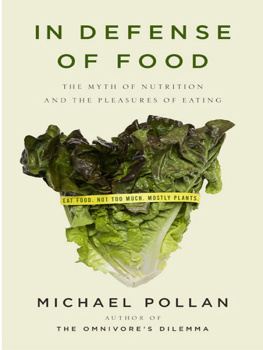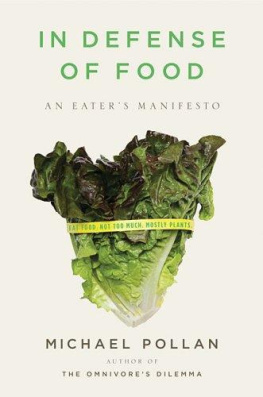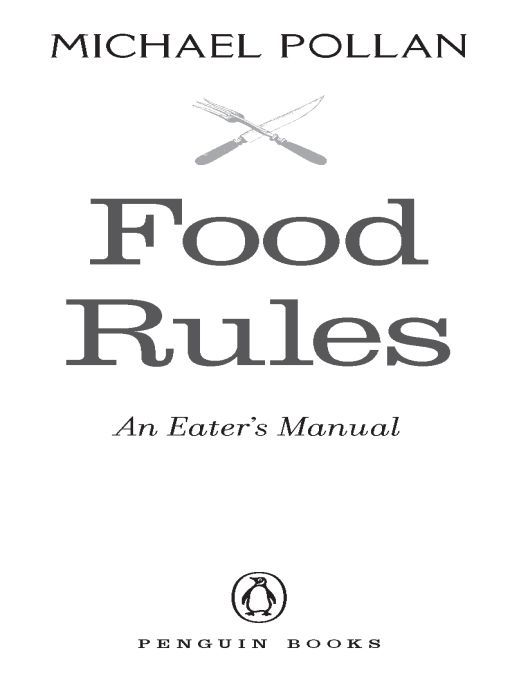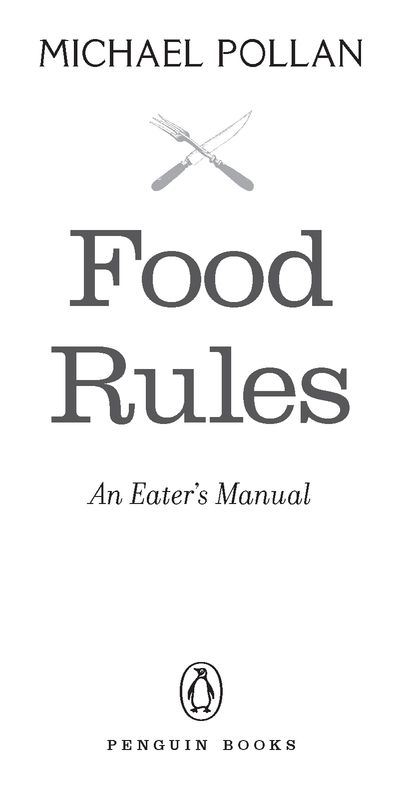Table of Contents
PENGUIN BOOKS
FOOD RULES
MICHAEL POLLAN is the author of five previous books, including In Defense of Food, a number one New York Times bestseller, and The Omnivores Dilemma, which was named one of the ten best books of the year by both the New York Times and the Washington Post. Both books won the James Beard Award. A longtime contributor to the New York Times Magazine, he is also the Knight Professor of Journalism at the University of California at Berkeley.
For my mother,
who always knew butter was better for you
than margarine
Introduction
Eating in our time has gotten complicatedneedlessly so, in my opinion. I will get to the needlessly part in a moment, but consider first the complexity that now attends this most basic of creaturely activities. Most of us have come to rely on experts of one kind or another to tell us how to eatdoctors and diet books, media accounts of the latest findings in nutritional science, government advisories and food pyramids, the proliferating health claims on food packages. We may not always heed these experts advice, but their voices are in our heads every time we order from a menu or wheel down the aisle in the supermarket. Also in our heads today resides an astonishing amount of biochemistry. How odd is it that everybody now has at least a passing acquaintance with words like antioxidant, saturated fat, omega-3 fatty acids, carbohydrates, polyphenols, folic acid, gluten, and probiotics? Its gotten to the point where we dont see foods anymore but instead look right through them to the nutrients (good and bad) they contain, and of course to the caloriesall these invisible qualities in our food that, properly understood, supposedly hold the secret to eating well.
But for all the scientific and pseudoscientific food baggage weve taken on in recent years, we still dont know what we should be eating. Should we worry more about the fats or the carbohydrates? Then what about the good fats? Or the bad carbohydrates, like high-fructose corn syrup? How much should we be worrying about gluten? Whats the deal with artificial sweeteners? Is it really true that this breakfast cereal will improve my sons focus at school or that other cereal will protect me from a heart attack? And when did eating a bowl of breakfast cereal become a therapeutic procedure?
A few years ago, feeling as confused as everyone else, I set out to get to the bottom of a simple question: What should I eat? What do we really know about the links between our diet and our health? Im not a nutrition expert or a scientist, just a curious journalist hoping to answer a straightforward question for myself and my family.
Most of the time when I embark on such an investigation, it quickly becomes clear that matters are much more complicated and ambiguousseveral shades grayerthan I thought going in. Not this time. The deeper I delved into the confused and confusing thicket of nutritional science, sorting through the long-running fats versus carbs wars, the fiber skirmishes and the raging dietary supplement debates, the simpler the picture gradually became. I learned that in fact science knows a lot less about nutrition than you would expectthat in fact nutrition science is, to put it charitably, a very young science. Its still trying to figure out exactly what happens in your body when you sip a soda, or what is going on deep in the soul of a carrot to make it so good for you, or why in the world you have so many neuronsbrain cells!in your stomach, of all places. Its a fascinating subject, and someday the field may produce definitive answers to the nutritional questions that concern us, butas nutritionists themselves will tell youtheyre not there yet. Not even close. Nutrition science, which after all only got started less than two hundred years ago, is today approximately where surgery was in the year 1650very promising, and very interesting to watch, but are you ready to let them operate on you? I think Ill wait awhile.
But if Ive learned volumes about all we dont know about nutrition, Ive also learned a small number of very important things we do know about food and health. This is what I meant when I said the picture got simpler the deeper I went.
There are basically two important things you need to know about the links between diet and health, two facts that are not in dispute. All the contending parties in the nutrition wars agree on them. And, even more important for our purposes, these facts are sturdy enough that we can build a sensible diet upon them. Here they are:
FACT 1. Populations that eat a so-called Western dietgenerally defined as a diet consisting of lots of processed foods and meat, lots of added fat and sugar, lots of refined grains, lots of everything except vegetables, fruits, and whole grainsinvariably suffer from high rates of the so-called Western diseases: obesity, type 2 diabetes, cardiovascular disease, and cancer. Virtually all of the obesity and type 2 diabetes, 80 percent of the cardiovascular disease, and more than a third of all cancers can be linked to this diet. Four of the top ten killers in America are chronic diseases linked to this diet. The arguments in nutritional science are not about this well-established link; rather, they are all about identifying the culprit nutrient in the Western diet that might be responsible for chronic diseases. Is it the saturated fat or the refined carbohydrates or the lack of fiber or the transfats or omega-6 fatty acidsor what? The point is that, as eaters (if not as scientists), we know all we need to know to act: This diet, for whatever reason, is the problem.
FACT 2. Populations eating a remarkably wide range of traditional diets generally dont suffer from these chronic diseases. These diets run the gamut from ones very high in fat (the Inuit in Greenland subsist largely on seal blubber) to ones high in carbohydrate (Central American Indians subsist largely on maize and beans) to ones very high in protein (Masai tribesmen in Africa subsist chiefly on cattle blood, meat, and milk), to cite three rather extreme examples. But much the same holds true for more mixed traditional diets. What this suggests is that there is no single ideal human diet but that the human omnivore is exquisitely adapted to a wide range of different foods and a variety of different diets. Except, that is, for one: the relatively new (in evolutionary terms) Western diet that most of us now are eating. What an extraordinary achievement for a civilization: to have developed the one diet that reliably makes its people sick! (While it is true that we generally live longer than people used to, or than people in some traditional cultures do, most of our added years owe to gains in infant mortality and child health, not diet.)
There is actually a third, very hopeful fact that flows from these two: People who get off the Western diet see dramatic improvements in their health. We have good research to suggest that the effects of the Western diet can be rolled back, and relatively quickly.
Yet, oddly enough, these two (or three) sturdy facts are not the center of our nutritional research or, for that matter, our public health campaigns around diet. Instead, the focus is on identifying the evil nutrient in the Western diet so that food manufacturers might tweak their products, thereby leaving the diet undisturbed, or so that pharmaceutical makers might develop and sell us an antidote for it. Why? Well, theres a lot of money in the Western diet. The more you process any food, the more profitable it becomes. The healthcare industry makes more money treating chronic diseases (which account for three quarters of the $2 trillion plus we spend each year on health care in this country) than preventing them. So we ignore the elephant in the room and focus instead on good and evil nutrients, the identities of which seem to change with every new study. But for the Nutritional Industrial Complex this uncertainty is not necessarily a problem, because confusion too is good business: The nutrition experts become indispensable; the food manufacturers can reengineer their products (and health claims) to reflect the latest findings, and those of us in the media who follow these issues have a constant stream of new food and health stories to report. Everyone wins. Except, that is, for us eaters.


